Greetings, ImpactAlpha readers!
Featured: Deal of the Day
TPG’s Rise Fund bets on accelerated growth in solar electricity in India. India’s aggressive shift to solar energy is attracting big-name private-equity players. TPG’s Rise Fund has taken a $70 million stake in Hyderabad rooftop-commercial solar developer, Fourth Partner Energy. And Japanese broadcaster NHK reports the SoftBank Group is aiming to invest between $60 billion and $100 billion in solar-power generation in India. India is ahead of plan on the government’s renewable energy target of 175 gigawatts of installed capacity by 2022. Government officials now talk unofficially about reaching 225 gigawatts by that date.
Rooftop solar projects for industrial, commercial and government customers, as well as residential, are forecast to account for 40 gigawatts by 2022. Fourth Partner Energy says it has so far completed more than 1,500 projects across 22 Indian states, totaling about 50 megawatts of generating capacity. Fourth Partner Energy claims its platform “has the potential” to avert more than 16 million metric tons of carbon from the atmosphere, as well as reduce water-use and emissions from diesel generators. “The more solar systems they deploy, the more they save their customers money and the greater the positive environmental impact,” said The Rise Fund’s Rick Needham.
Read more in “TPG’s Rise Fund bets on accelerated growth in solar electricity in India,” by David Bank on Impact Alpha.
Dealflow: Follow the Money
Leapfrog Investments takes stake in Nigerian pension fund manager ARM Pensions. Pensions are one of the fastest growing segments in Nigeria’s financial industry. In February, Leapfrog exited Petra Trust, Ghana’s largest independent pension provider. More.
Mission investors lend $7 million to restore 150 Sandy-impacted homes. At least 650,000 New Jersey homes were damaged or destroyed during 2012’s Hurricane Sandy. Many have not yet been rehabilitated. Community Housing Capital and Calvert Impact Capital financed Community Asset Preservation Corp. to buy, rehabilitate and turn into affordable housing about 150 homes. Read on.
Signals: Ahead of the Curve
Opportunity Zones are here. It’s official: Some census tracts are more equal than others. The Treasury Department certified 8,700 census tracts across the U.S. that are eligible for investments by new Opportunity Funds, for which investors can defer and reduce their capital gains tax bills. The Economic Innovation Group, which pushed for the policy, has put together a searchable map and analysis of the Zones.
- High need. The poverty rate in the certified Opportunity Zones is nearly 31%, with average median family incomes at only 59% the median for their areas. Both are well above the law’s requirements.
- Growth potential. The Zones already contain 24 million jobs and 1.6 million businesses. Three-quarters of the areas have rebounded, at least a bit, from the Great Recession with job growth between 2011 and 2015.
- Impact watch. Rules for the funds are still sketchy, as are safeguards to ensure they truly expand access for low-income residents and businesses. Impact investors have begun to mobilize a push for “inclusive” Opportunity Zones.
Impact Voices: Pass the Mic
Impact Carry: A proposal for a carrot-based approach to boosting impact. It’s an article of faith that fund managers deserve performance-based compensation (witness the durability of the carried-interest preference in U.S. tax law). Should impact performance be otherwise? “It’s time we introduce impact carry,” writes Bamboo Capital’s Arun Asok from Singapore. “Incentives for creating social returns should be structured to generate further social impact.”
Asok’s proposal follows other efforts to align the interests of investors (see Rockefeller Foundation’s Social Impact Note), as well as social enterprises (see Roots of Impact’s Social Impact Incentives) with targeted social outcomes. Asok’s proposal aims to tackle a chronic problem for impact investors in small- and medium-sized enterprises in the developing world: the need for technical assistance to de-risk investments and boost enterprise success. His proposal is to create a social return-based investment carry to be paid annually as a contribution by investors into a technical assistance pool managed by fund managers. The idea is that the TA pool would boost the social returns of fund managers’ portfolios by funding, for example, an impact survey or consulting on ethical pricing. Read Asok’s full proposal for ‘impact carry’ on ImpactAlpha.
Agents of Impact: Follow the Talent
Steve Case’s Revolution venture capital firm has a career page with more than 1,000 jobs at portfolio companies in 105 U.S. cities… The Aspen Network of Development Entrepreneurs is splitting $150,000 among up to six impact-measurement and gender-inclusion projects in Latin America… Fidelity Charitable’s Sarah Gelfand talked donor-advised funds with financial news network Cheddar (video).
–June 18, 2018.











